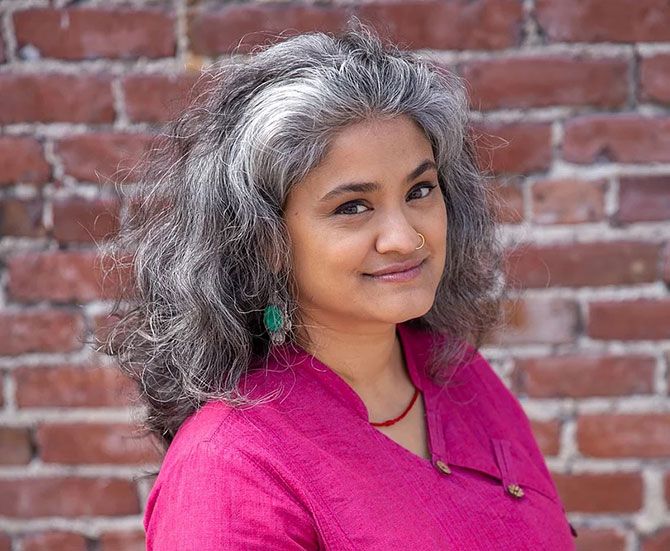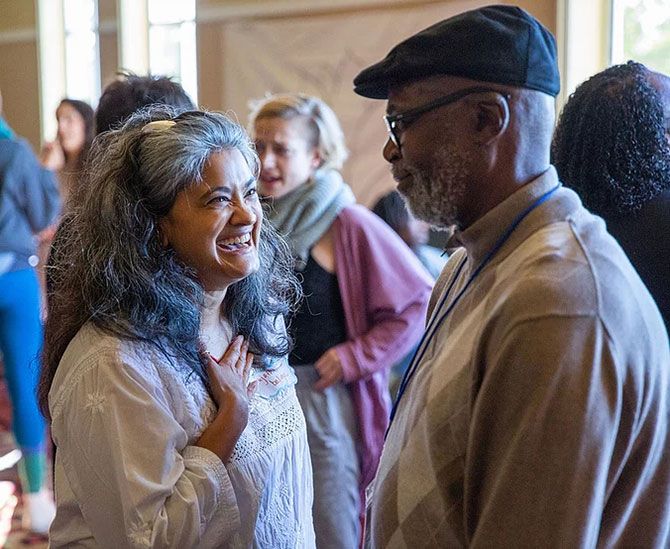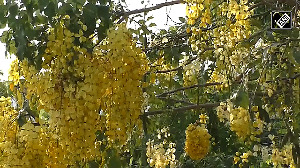Sujatha Baliga won America's most prestigious fellowship for her work on the journey to forgiveness and restorative justice.
P Rajendran reports from New York.

As Sujatha Baliga looked on, the family of the murdered girl hugged the man who had killed her.
Baliga, who won a MacArthur 'Genius' Fellowship this year, is a proponent of restorative justice, which involves justice that does not appear retributive, but relies on a consensual and direct dialogue between the survivor and the attacker that addresses the needs of those who endured harm and those who caused it.
She is the director of the Restorative Justice Project at Impact Justice, a centre devoted to novel ideas in justice reform.
Restorative justice was not an abstract concept that Baliga dispassionately found effective.
It was lot more personal than that.
Sexual abuse by her father in her childhood had left her angry, resentful, deeply conflicted and driven to retribution.
"My inclination was not to seek help. The system on offer was not what I wanted," she said, describing the difficulty of being a minority in a small rural town in Pennsylvania.
"I didn't want my father being arrested. There were immigration consequences, too."
She told her mother of what she had had been through only when she was 16, when her father was on his deathbed.
"The look on her face showed me she had no idea," Baliga said.
The seething anger took its toll on the young girl, but her grades were good enough to get her into Harvard, where she hoped to study Sanskrit.
But soon she began waking up politically.
"I became interested in sexual and intimate partner violence and women's economic autonomy," she said, wondering if she would have brought up her experiences earlier "if my mother had been economically independent."

At 24, she joined her then boyfriend in Mumbai and worked at a school for children of HIV-positive sex workers.
She found that though the women had endured terrible abuse -- a lot worse than she herself had -- they were able to tap into some reservoir of tranquility that she was denied and yet be less damaged.
They told her they had forgiven their tormentors, an idea Baliga could not get her mind around.
Baliga had a breakdown that led them to suggest that she meet the Dalai Lama, their spiritual guru, who was in Dharamsala,
It seemed unlikely that a world leader would meet her, but she went to Dharamsala, wrote a note that she left at his residence that effectively asked, 'How does one forgive seemingly unforgivable acts?'
A week later, she got an hour-long audience with the Dalai Lama.
She had no problem when the spiritual leader suggested that meditation might help.
But she laughed in derision when he asked her to also try and empathise with the person who had done her harm.
She agreed to meditate, though.
"He gave me some beautiful advice. It changed my life completely," she said.

Back in the US, she entered law school at the University of Pennsylvania, graduating in 1999.
She worked in federal court as a law clerk and a public defender.
She was also a board member and volunteer at a rape crisis centre.
That seemed like a pretty full schedule.
"Before meeting His Holiness, I was burning myself at both ends. After that, meditation became my bedrock.
"My ability to do work is entirely due to the spiritual guidance I got from many Buddhist teachers over the past two decades. My meditation and daily prayers allow me to do really hard work," she said.
After many years practicing criminal defence work, she concluded the game was not worth the candle; she was addressing only one part of the puzzle.
She decided to look at the issue from her own viewpoint.
"My desire to find solutions that would have helped my whole family heal -- that led me to restorative justice," Baliga said.
"The criminal legal system in the US and most parts of the world pits one side against another," she said.
"While (now) I surely wanted my dad to stop being abusive, I didn't want to see him in a cage. I was interested in changing his behavior without relying on punishment."

According to Baliga, "Restorative justice is a paradigm shift in the way we think about wrongdoing.
"Instead of asking what law was broken by the person and how they should be punished, we want to ask different questions: 'Who was harmed, what do they need, and whose obligation is to meet those needs'.
"Instead of the State exacting punishment from individuals, the community hold people to account," and help address the survivor's needs," she said.
"Most crime survivors exactly know what they need," she added.
"We see them stressed out in the media and in the courts."
But she said the attitude changes "If you sit down and ask them what happened to them and listen for a really long time, if they are asked, 'What do you need? How can we meet those needs? Whose obligation is it to meet those needs?'
Every person who suffers harm has different needs and go through different phases while experiencing trauma.
Her experience in the judicial system is that the court process exacerbates trauma.
"In restorative justice, our aim to create safest, most positive environment so people can ascertain what their material and justice needs are," she said.
So Baliga took training in the restorative justice, learning novel ideas such as the peacemaking circle process, Maori family group conferencing, and various other forms of justice that lacked even a whiff of vengeance.
"I took different pieces of what I learned, and saw what I could use in Oakland, California."
She ensured that restorative justice, instead of being a mere add-on, actually involved sending cases to community organisations that worked with the person who caused the damage to plan ways to repair the damage.
The idea, Baliga said was to stop "Thinking in terms of punishment. If you think about it -- repairing harm -- it makes sense."
The effort is led by the person who experienced harm, with the involvement of everyone affected, and ultimately doing right by themselves.
As she put in in a Vox article, 'I wanted what Ana María Archila Gualy, the survivor who confronted US Senator Jeff Flake when he stated he planned to vote to confirm Brett Kavanaugh to the supreme court, described: 'The way that justice works is that you recognise harm, you take responsibility for it, and then you begin to repair it'.
Accusations of sexual assault had followed his nomination and eventually appointment to America's highest court.

Baliga believes that while many incarceration units put 'correctional,' penitentiary' and 'rehabilitation' in their titles, the data showed that they do not live up to the names.
She cited a study which showed that only 13 percent of children who had committed felonies and went through a restorative justice programme did them again; by comparison, those who just went through the courts had a 53 percent recidivism rate.
Other studies, including those comparing many studies, have shown that restorative justice works -- in particular for the person harmed.
"Forgiveness is not a prerequisite for participation," Baliga clarified, "nor an expected outcome."
All that was being sought, she said, was "a relinquishment of anger and feelings of forgiveness even if the word is not said.
It's not about putting a tidy bow on anything at the end of the process.
"I would rather ask survivors, 'Are you satisfied with process?' 'Have your needs been met' 'Were you treated with respect by the facilitators and participants?'
There is no way to get a person who caused harm to be responsible without meeting their needs, too."
Baliga said that this approach has been better than that of the San Francisco district attorney's office, and that it is important to acknowledge when the data shows that mass criminalization is ineffective in its own stated goals.
"We have also shown in Alameda county, for participating crime survivors, a 91 percent satisfaction rate with (the restorative justice) process -- and (the likelihood that they) would recommend it to a friend, would prefer it to the courts."
That was also true of the families involved in the murder mentioned at the beginning of this story.
The man unreservedly admitted his guilt -- and feelings of remorse -- to the family of the girlfriend he had shot dead in a moment of rage.
Despite the case being in Florida, the prosecutor worked with the families and the accused to get him 20 years in jail and 10 more on probation.
As for herself, while Baliga has forgiven her father, she says her mother is on her own journey.
Baliga noted that while her mother, using the plural as many Indians do, had said, 'We have forgiven him', she preferred to leave it to her mother to tell her own story.
For now, Baliga is hoping to use the MacArthur fellowship prize money to pay back her "cumbersome student debts," and work on two books she has in mind -- one, on the journey to forgiveness and how she followed the Dalai Lama's suggestions as a roadmap, and two, about the secular values that undergird the meaning of the word 'justice.'
As she concluded, "I am trying to get the word out. I want to be an ambassador of these ideas to India and the world."











 © 2025
© 2025